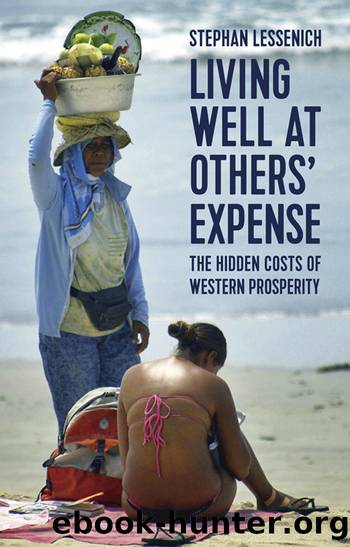Living Well at Others' Expense by Stephan Lessenich;

Author:Stephan Lessenich; [Lessenich, Stephan]
Language: eng
Format: epub
Publisher: John Wiley & Sons, Inc.
Published: 2019-04-16T00:00:00+00:00
Design or disaster â or democracy after all?
This might all sound a little unkind and perhaps even unfair. But it's the principle that matters â or, in this case, two principles: consumer choice versus structural change. âConcern is not enoughâ, said the Swiss director and playwright Milo Rau in a noteworthy contribution to the ârefugee disasterâ, a topic that will be looked at in greater detail in the next chapter.55 His dictum also applies to the context of unequal ecological exchange being considered here: concern, reparation supplements and ethical consumption are not sufficient to overcome the underlying structural problems of asymmetrical power distribution in the global capitalist system. Nor do âintelligentâ technologies provide a solution, as long as the fatal alliance between private profit, systematic growth imperatives and structural power asymmetries is not broken up.
There can be no material growth without growing resource and energy consumption â and hence further destruction of habitats and the natural environment. Above all, there can be no growth in the early industrialized societies of the Global North, inflated by the post-war economic boom into high-performance and extreme consuming economies, that is not at the expense â rising even further with every percentage point of increase in the GNP â of exploitation, and of nature and social habitats, in the Global South. The term âgreen economyâ frequently arises in discussion of the future of growth capitalism, suggesting that the power of an enlightened consumer society could combine with energy-efficient and eco-effective technological innovations to permit âgreen growthâ.56 But, however understandable the vain desire to separate growth from exploitation of natural resources while retaining the living conditions and consumer habits of the externalization society might be in theory, in practice it must remain an illusion. It is not even necessary to make fun of the most absurd flowers of this unfettered lifestyle ecology â edible aircraft seat covers fitted in the first-class section of the long-haul Airbus A38057 â to show up âgreen capitalismâ for what it is: the hoped-for sheet anchor for highly developed economies that are feeling the pinch after the latest cycle of capital accumulation, and the desperate reassurance for an externalization society doing its utmost to somehow salvage its exclusive lifestyle model in spite of all the signs that it has run out of steam.
Similar drives are at work when it is not only business lobbyists and financial analysts but also âordinary peopleâ who get excited about, or make fun of, the discussion of âpeak oilâ, âpeak waterâ or âpeak everythingâ58 that has been conducted recurrently in environmental policy circles and among critics of capitalism since the 1972 Club of Rome report about the âlimits to growthâ59 â the worry in these circles that the maximum amount of oil, the maximum worldwide availability of freshwater, or the maximum amount of practically any non-renewable resource has been reached or will soon be exceeded. Confronted by such prophecies of doom, âexpertsâ and non-experts alike point to the sinking oil prices, to new and âunconventionalâ
Download
This site does not store any files on its server. We only index and link to content provided by other sites. Please contact the content providers to delete copyright contents if any and email us, we'll remove relevant links or contents immediately.
International Integration of the Brazilian Economy by Elias C. Grivoyannis(74483)
The Radium Girls by Kate Moore(11616)
Turbulence by E. J. Noyes(7694)
Nudge - Improving Decisions about Health, Wealth, and Happiness by Thaler Sunstein(7238)
The Black Swan by Nassim Nicholas Taleb(6761)
Rich Dad Poor Dad by Robert T. Kiyosaki(6174)
Pioneering Portfolio Management by David F. Swensen(6076)
Man-made Catastrophes and Risk Information Concealment by Dmitry Chernov & Didier Sornette(5643)
Zero to One by Peter Thiel(5487)
Secrecy World by Jake Bernstein(4387)
Millionaire: The Philanderer, Gambler, and Duelist Who Invented Modern Finance by Janet Gleeson(4089)
The Age of Surveillance Capitalism by Shoshana Zuboff(3980)
Skin in the Game by Nassim Nicholas Taleb(3965)
The Money Culture by Michael Lewis(3843)
Bullshit Jobs by David Graeber(3826)
Skin in the Game: Hidden Asymmetries in Daily Life by Nassim Nicholas Taleb(3720)
The Dhandho Investor by Mohnish Pabrai(3560)
The Wisdom of Finance by Mihir Desai(3523)
Blockchain Basics by Daniel Drescher(3326)
